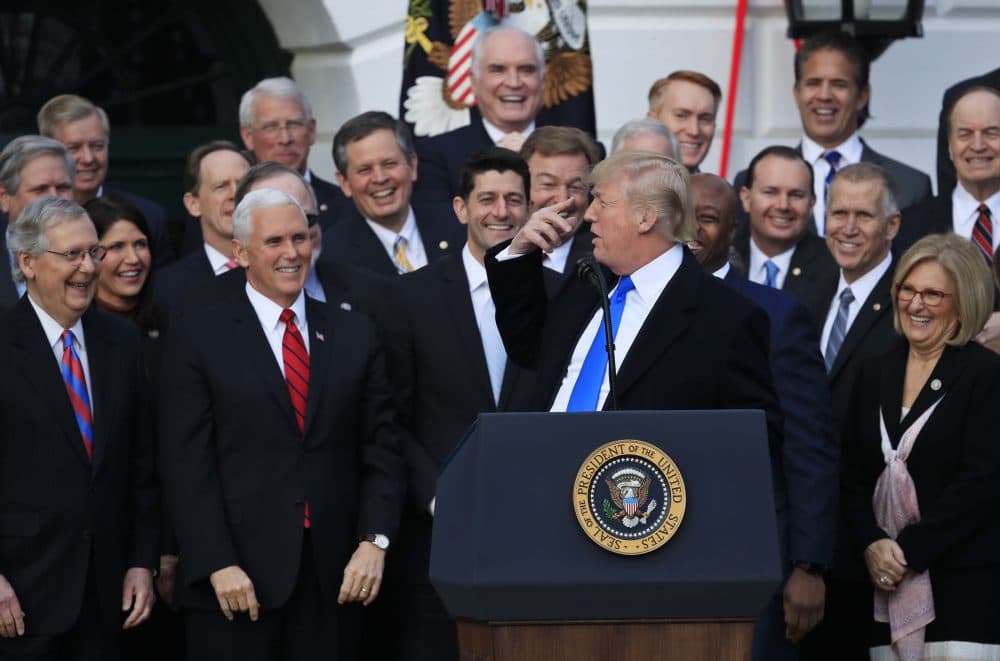Advertisement
The Breakdown Of The Rule Of Law
Resume
This week on Freak Out And Carry On, Ron Suskind and Heather Cox Richardson talk with Benjamin Wittes, editor in chief of Lawfare and senior fellow at the Brookings Institution, and Jonathan Rauch, a contributing editor at The Atlantic and a senior fellow at the Brookings Institution. Together they wrote "Boycott the Republican Party" in this month's The Atlantic.
They discuss the repercussions of the Nunes memo, the role of Congressional Republicans in Trump's attack on the FBI and the Justice Department, and their faith in the Mueller investigation.
Excerpts
Ron Suskind: We need to talk about the Nunes memo and everything around it. It's a center of a very large, confusing storm. But let's first state clearly what's going on here. We're dealing with something of utmost seriousness: rule of law, that key, three-word phrase upon which everything rests. Trump has attacked the FBI and the Justice Department calling them "disgraceful" saying they should be ashamed. That's after he balked at the request of his handpicked FBI director Christopher Wray, who said don't release the memo. He all but pleaded. Deputy director of the FBI Andrew McCabe was pushed out. The president threatens regularly, almost hourly, to fire Deputy Attorney General Rod Rosenstein who of course is the person who would have to get rid of Bob Mueller if that moment ever arrived. So let's get to the man of this season, of this year, special counsel Robert Mueller, slightly removed and protected at least while Rosenstein stays put as deputy attorney general. He's investigating Trump's 2016 campaign ties to Russia and Trump's possible obstruction of justice in 2017. Trump and the GOP can't decide if the Nunes memo is or is not about the Mueller investigation. I mean that's what makes this whole thing even worse. Congressional Republicans don't know which side they ought to be on, which side their college professors would tell them to be. What they seem to agree upon only is that they will not fight Donald Trump. Period. Paragraph. They will not stand up for the independence and the principle of rule of law. Heather, how seriously are you taking this every day and every night you sit up late?
Heather Cox Richardson: Oh I'm taking it incredibly seriously. But let me just say, I think when I talk to people that the whole fight over the FISA court and Nunes memo and who Rosenstein is and all that, gets really confusing for most people. For me the breaking moment was not the release of the memo, the breaking moment was on Monday when the president was supposed to put in place sanctions on Russia according to Congress, which passed a law overwhelmingly-- there were only five votes against it in both the House and the Senate, everybody said you have to put sanctions on Russia--and he simply said that we don't need them. I'm not going to do it. And this to me was terrifying. A terrifying breakdown of the president saying to Congress which is the body that makes our laws. I don't care what you think we need for laws. I disagree so I'm not going to do it. That was huge. I freaked out over that one! Then coming up to the Nunes memo I was very frightened because everything I had read about it suggested there was going to be enough material in it to cover people's backsides when it came time to do some firings of Rosenstein or Mueller or people who were involved. To say well, the FBI and the Department of Justice were just wrong on this one. They were corrupt. There's enough coverage that we're OK, And then the thing came out and I was like, "Seriously? Seriously?" I wasted five days of my life worrying about this? Because it's badly written. It's contradictory. In fact there's nothing here we didn't know. This doesn't cover anybody's tushy at all. That's a very good sign. If that's the best they could do--and they certainly put an awful lot of chips down on that memo--and it was a complete dud. If that's the best they got when we know how much stuff Mueller has, I feel better about this than I would have been if we had been recording this before the memo came out.
Benjamin Wittes: I think the most important element of the Nunes memo is not anything in the memo, it's the fact that the memo exists at all. So in the wake of Watergate, the intelligence community and the broader executive branch and Congress reached a kind of grand bargain as to how we were going to prevent things like Watergate and things like the intelligence abuses of the civil rights era and Vietnam era from happening again. And the grand bargain worked something like this, at least the congressional side of it: Congress would set up these highly secure oversight environments where the intelligence community could give up their deepest, darkest secrets and congressmen could supervise and verify that the programs were being conducted in a fashion that comported with the law. And the second was that the environment would be secure, that it would be actually safe for things like intelligence sources and methods to talk about them with members of Congress in these environment. Now what Nunes did is a profound betrayal of both of those premises. And it's the first time this has ever happened in the 40 years of the grand bargain. The Intelligence Committee chairman, with the active involvement of the President of the United States, blew an intelligence source, publicly disclosed an intelligence source and subjected him to ridicule, publicly disclosed the target of a FISA warrant and publicly disclosed material that constituted the contents of FISA application. And did that all in order not to validate or not to explain the behavior of the intelligence community but rather to lie about it.
Heather Cox Richardson: The thing that jumped out to me about your piece gentlemen is that while everybody is focusing on the Nunes memo, on the things that Donald Trump is tweeting, Donald Trump is doing, what your piece does is it pulls together a new sentiment that I've seen around after the backlash with a Nunes memo and that's saying that this isn't just Donald Trump, this is the entire Republican Party. They own him at this point and we have to punish them as a group, as a party, rather than simply punishing Trump. And this struck me as being a really new moment in American political discourse and certainly a new moment in the Republican Party and I wonder if you, Jonathan, would like to talk about just the degree to which the Congressional Republicans are complicit in what's going on in DC and where we should go from here?
Jonathan Rauch: Heather, I wish it were just the congressional Republicans. It's certainly the House Republicans. It's about half of the Senate Republicans. Most important, it's the Republican base, 80 percent of which consistently lines up behind Trump no matter what he does. He has said he could shoot someone on Fifth Avenue and retain their support. And apparently that is the case. What we've learned through, for example, the nomination of Roy Moore, a proudly lawless candidate to be the Senate candidate in Alabama, and through the Nunes memo, where you saw the House line up to politicize the intelligence world, and in multiple other instances, is that the Republican Party is no longer committed in a serious right to the rule of law. They are willing to undermine it. Trump is, of course, a driver of that but he's also a symptom of it. And if he went away tomorrow it's quite possible that this behavior would continue. That's to me the critical takeaway of our article. It's not enough just, if you could, impeach Trump. It's not enough to just do that. You need a firm political statement from the American public that a party that behaves this way will be isolated from power preferably at every level of government.
The views and opinions expressed in this podcast are solely those of the participants and do not in any way reflect the views of WBUR management or its employees.
